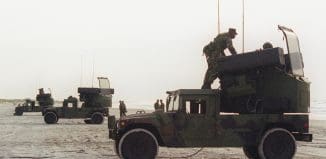The new arms deals between the U.S. and Iraq puzzle Israel
This post is also available in:  עברית (Hebrew)
עברית (Hebrew)
 “The easiest thing for them to do would be to just sell those weapons systems direct to Iran. They will soon get to their hand as they take over Iraq” an Israeli sources told i-HLS.
“The easiest thing for them to do would be to just sell those weapons systems direct to Iran. They will soon get to their hand as they take over Iraq” an Israeli sources told i-HLS.
Since July 25th, the Pentagon has notified Congress of a series of Foreign Military Sales (FMS) to Iraq worth about $4.3 billion that includes everything from infantry carriers to ground-to-air rockets. When looking at the larger picture, the sale can be seen as a hedge against the possibility of a nuclear Iran next door, as well as a way to assist the Iraqis in handling the increasingly bloody sectarian terror threat emanating from within its own borders.
Over the past several months, resurgent al-Qaida cells, working inside the country, have launched a series of gruesome bomb attacks, killing hundreds of Iraqis and throwing the country’s long-term stability into question.
“Iraq is moving back to a primary state of civil war, and its internal focus is coming back to counterinsurgency and counterterrorism” said Anthony Cordesman, of the Center for Strategic and International Studies. While the missile defense systems the US wants to sell Iraq may be useful against a potential outside threat, “the real world problems in Iraq are very much dominated by internal instability,” he said.
The latest deal, announced Aug. 5, is a $2.4 billion air defense package for 681 Stinger anti-aircraft missiles and 40 truck-mounted launchers, Sentinel radars, and three Hawk anti-aircraft batteries with 216 Hawk missiles. These systems “will provide Iraq with the ability to contribute to regional air defenses and reduce its vulnerability to air attacks,” the Pentagon wrote to Congress.
An April 2013 report from the Special Inspector General for Iraq Reconstruction included an interview with the commander of the Office of Security Cooperation-Iraq, Lt. Gen. Robert Caslen, who reported that when touring the country’s main American-built military supply warehouse earlier this year, he found that spare parts for the country’s ground vehicle fleet had been literally gathering dust on the shelves because the Iraqis lacked the ability — or the desire — to get the parts to units that may have needed them. “When we left, it all crumbled, and the institutional base of the Iraqi Security Forces started crumbling too because the U.S. forces had been holding it up,” he said. “Iraq didn’t have the resources to sustain what we left.”
According to Defense News the hope in the U.S. administration is that the deal for maintenance support would begin to fill in some of those widening gaps.






























